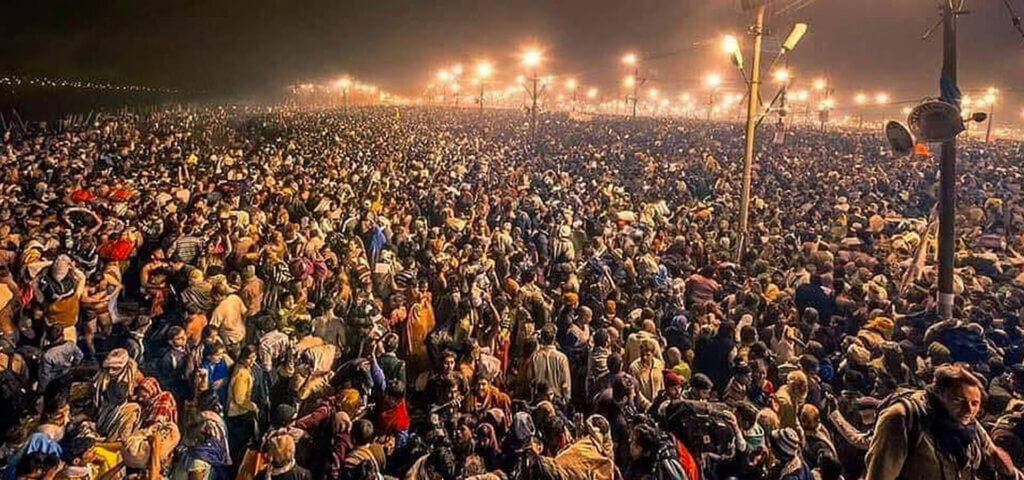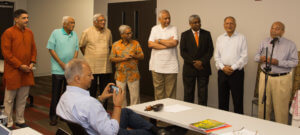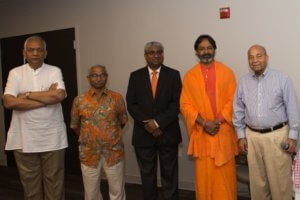I once asked my American-born son, an academician at Stanford University, “What is your caste?” He rolled his eyes, trying to guess based on what his sixth-grade teacher had taught him. I had to clarify, “What is your caste, not what it should be?” He had no answer. This anecdote underscores a larger issue: caste is often portrayed in American discourse as intrinsic to Hinduism, despite its complex and evolving history.

Kumbh Mela 2025: Some 500+ million Hindus gathered to take a dip in the Holy Ganga. Attribution: Dr. Pushpendra Singh Rathore Wikimedia Commons
Kumbh Mela 2025: There is No Caste, only Hindus
Some 500+ million Hindus, more than the entire population of the USA, Mexico and Canada combined, attended a religious pilgrimage at one spot in Prayag Raj, India. Hindus stand shoulder to shoulder at train stations and walk on roads leading to the river site. No one asks the other about their caste, nor is there a single sign segregating people based on caste. The sole focus of all Hindus present is to take a dip in the Holy Ganga to receive spiritual purification. Amidst the vast sea of humanity, distinctions of caste, class, and status fade, as millions unite in devotion, embodying the true essence of Hinduism—faith, unity, and surrender to the divine.
What is the Caste System?
sanctioned by the Vedas or other Hindu texts and teachings, nor is it intrinsic to Hinduism or a feature of its entire history. Hinduism has concepts of Varna (personality types, tendencies) and Jati (occupational guilds), which differ fundamentally from the rigid notion of caste.
The Varna system in the Dharma-shastras categorized society into four groups: Brahmin (scholars), Kshatriya (warriors), Vaishya (merchants), and Shudra (laborers). This system fostered specialization and mutual interdependence, essential for a thriving society. For example, a farmer’s son would inherit both land and the skills necessary for farming. A society built entirely on the principle that “everyone is exactly the same” undermines both specialization and healthy interdependence.
Jati can be understood as the practical application of occupational continuity. A goldsmith’s son, for instance, would often become a goldsmith, passing down skills through generations. Similarly, in the Western world, George H.W. Bush and George W. Bush both pursued politics, a family occupation that parallels Jati. Over generations, such patterns create occupational communities or Jatis.
However, over millennia, what was originally a skills- and aptitude-based guild system became distorted into a hereditary hierarchy. This rigidification was influenced by evolving social taboos and practices, as well as the consequences of repeated foreign invasions, which disrupted the original fluidity of the system.
What is My Caste?
“Caste,” as it exists today, is a colonial construct alien to Hindu philosophy. My family history illustrates this fluidity: my grandfather was a farmer and my father a businessman, both traditionally categorized as a Vaishyas. Business was not in my genes, and I chose instead to work for someone that qualifies me to be a Shudra, a working class. I chose an entirely different path, working in education and research, which could classify me as a Brahmin. While advocating for equality today, I could also be considered a Kshatriya. The colonial rigidity of caste definitions fails to capture this nuanced reality, and I reject allowing such labels to define me.
Caste as a Misrepresented Narrative
Recently, universities like UC Davis, Cal-State , and Harvard have added “caste” as a protected category in their anti-discrimination policies. In California, a caste-related bill, SB 403 , narrowly avoided becoming law after being vetoed by the governor. Organizations like Equality Labs and Hindus for Human Rights have amplified this narrative, branding Hinduism as inherently casteist. In American classrooms, caste dominates discussions of Hinduism, planting misconceptions even in the minds of Hindu-American children—many of whose families have never observed caste discrimination being in practice, neither in India nor in America.
Is Caste Discrimination a Reality in America?
- https://indiawest.com/2022/03/10/caste-cal-state-versus-my-great-grandchildren/
- https://www.patheos.com/blogs/equalityforhappiness/2024/04/caste-bills-could-hurt-interfaith-couples/
- https://www.youtube.com/watch?v=sGQ4r4ElLyQ
Having spent over 40+ years in corporate America, I have never heard any discussion related to caste discrimination, either personally or about someone else. My wife’s best friend in India was a Dalit, and they routinely visited and dined together, experiences far removed from the grim narratives promoted by anti-Hindu activists. It is puzzling that some people, like my wife, come to America only to “learn” about caste issues in India.
Why Single Out Hinduism?
Caste-based discrimination is often unfairly tied exclusively to Hinduism, ignoring divisions like Shia-Sunni-Ahmadiyya in Islam or Catholic-Protestant-Mormon in Christianity. It would be wrong to stereotype Christians and Whites as racists. All faiths have their internal conflicts, yet Hinduism is disproportionately targeted. This bias not only perpetuates stereotypes but also unfairly maligns a complex and diverse tradition.
Caste as a Political Tool
The caste narrative is often leveraged for political or ideological gains. India’s Prime Minister Narendra Modi’s perceived alignment with figures like Donald Trump has fueled such portrayals, linking Hindus with right-wing politics in America. Additionally, some caste-related activism may stem from evangelical agendas aimed at discrediting Hinduism.
Legal and Social Implications
New caste discrimination policies could have unintended consequences. For example, a Hindu manager firing another Hindu for legitimate reasons might face baseless caste-related discrimination charges, creating a chilling effect on employment decisions. This adds an unnecessary burden on employers and risks alienating Hindu professionals.
The Cisco Case: A Misguided Precedent
The Cisco case serves as a cautionary tale. Sundar Iyer , a self-declared atheist, was labeled an “upper caste Hindu Brahmin” based solely on his last name. The California Civil Rights Department’s pursuit of this case ended after years of litigation when defendants alleged prosecutorial abuse. Such cases highlight the dangers of relying on stereotypes to adjudicate justice.
A Call for Fairness
It’s time Americans reevaluated the caste narrative tied to Hinduism. Just as we don’t hold Christianity accountable for slavery or the Holocaust, or Islam for terrorism, Hinduism shouldn’t be unfairly judged based on caste stereotypes. Americans should resist casteophobia and approach these narratives with open minds, recognizing them for what they often are: tools to misrepresent and marginalize Hindus and their faith.
Author’s Messages on CASTE:
Caste Bills could Hurt Interfaith Couples
Intermarriage as a New Caterogy of Caste Systems
Caste: Cal-State Versus My Great Grandchildren, March 10, 2022
DGH: Hinduism will be Dismantled, Sept 11, 2021
The State versus Hindus, Feb 19, 2021
Santa Clara County Human Rights Commission debates caste, April 2021 and a Follow up May 21, 2021
CSU’s Caste Proposal is Wrong, Jan 22, 2022
In opposition to caste legislation, The Daily Journal, June 15, 2023
Revise California Caste Legislation SB-403, June 2023
Caste System in Hinduism
EqualityLabs’ Presentation at Stanford University, Feb 6, 2024
Will Zaheer Iqbal and Sonakshi Sinha break the dominant Muslim – submissive Hindu CASTE hierarchy in their intermarriage? July 16, 2024
The above article is written as a part of a Term Paper for a course at Hindu University of America titled Distinguishing Varna and Jati from Caste











6 thoughts on “There is No Caste, Only Hindus – A Call for Truth”
I’ve been following your blog for some time now, and I’m consistently blown away by the quality of your content. Your ability to tackle complex topics with ease is truly admirable.
“The caste narrative is often leveraged for political or ideological gains. India’s Prime Minister Narendra Modi’s perceived alignment with figures like Donald Trump has fueled such portrayals, linking Hindus with right-wing politics in America. Additionally, some caste-related activism may stem from evangelical agendas aimed at discrediting Hinduism.” Are you using the term “evangelical” to indicate proselytising Christianity?
Thank you for your comment. Within faith issues are there with all faiths, Hinduism is disproportionally blamed with caste narratives. It is a working progress and major improvement has already have been made.
Yes I meant proselytizer objective.
http://terios2.ru/forums/index.php?autocom=gallery&req=si&img=4546
A well written concise and succinct analysis, that describes what Hindus experience and suffer regularly. You are Indian, Hindu and whoa, immediately caste is conspicuously stamped on your forehead. My gut feelings totally rejected this populist view and narrative of my culture, traditions and civilisation. Hindus have continuously been tarred, so unfairly with the Caste label. My search for reality and truth freed me from these negative and judgmental stereotypes and I stand firm with my Hindu brothers and sisters and continue to strive to speak my truth.
I lived in California for 5 years and was witness to the California school text books. Listening to the students testify about their bullying experiences. How brave and valiant they were to stand in front of strangers, and expose your innermost feelings. Their heart wrenching, pleas for fairness and equitable representation, fell on stone hearts and deaf ears. For me, a mind boggling, ridiculous and utterly incomprehensible situation.
Protect the culture or protect the child? Both are intrinsically connected. I have no legal training but have a belief that rather than going the School Board route, (and the battle with the social science academics and use of Witzel to testify on their behalf) perhaps appealing to UNICEF and the Convention of the Child may have been a better, stronger and clearer option of seeking to protect the child. Why? One party vehemantly seeks to maintain control of their position, whereas the other party is totally concerned with the rights and well being of the child.
I strongly advocate that all of us should: resist referring to India as South Asia (air brushing of Indian history and culture) refer to India as Bharat (disconnecting us from our ancient culture)
refrain from using the term Hinduism and call ourselves as Sanatanis (why do we continue to utilise a term that someone else gave us, someone else added an ‘ism’, and others use to denigrate, attack and vilify us with)
Dilipji, my heart felt namaskar and thank you.
Sushila
Sushilaji,
Thank you for your note. I live in SF Bay Area. There is a lot to do to correct wrong narrative about Hinduism. Writing/publishing is one such good option. Read my other writings on Google. Please join me in variety of activities.